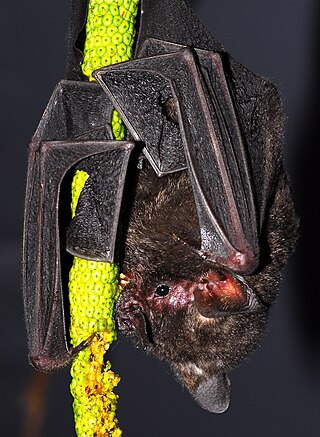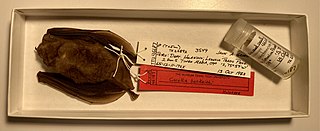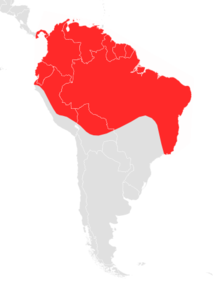
The New World leaf-nosed bats (Phyllostomidae) are bats found from southern North America to South America, specifically from the Southwest United States to northern Argentina. They are ecologically the most varied and diverse family within the order Chiroptera. Most species are insectivorous, but the phyllostomid bats include within their number true predatory species and frugivores. For example, the spectral bat, the largest bat in the Americas, eats vertebrate prey, including small, dove-sized birds. Members of this family have evolved to use food groups such as fruit, nectar, pollen, insects, frogs, other bats, and small vertebrates, and in the case of the vampire bats, even blood.

The short-tailed paradigalla is a species of bird-of-paradise.

The chestnut short-tailed bat is a bat species from South and Central America. The species is often confused with the Benkeith's short-tailed bat. It is a mainly frugivorous species that has been known to consume insects. To determine which pipers to forage on, it focuses on odour and then after proceeds to echolocate to determine position. It hunts between nightfall and midnight. Habitats include hollow trees, caves, cracks, abandoned mines, sewers, and house roofs. It does not decrease activity during full moons, only instances of turbulent weather like heavy rain. In an agricultural setting it has a higher resistance to habitat fragmentation compared to similar bat species.

Seba's short-tailed bat is a common and widespread bat species in the family Phyllostomidae. They are found in Central America, the northern parts of South America, and in the Antilles islands.

Carollia is a genus of bats often referred to as the short-tailed fruit bats. Along with the genus Rhinophylla, Carollia makes up the subfamily Carolliinae of family Phyllostomidae, the leaf-nosed bats. Currently, nine species of Carollia are recognized, with a number having been described since 2002. Members of this genus are found throughout tropical regions of Central and South America but do not occur on Caribbean islands other than Trinidad and Tobago. Bats of the genus Carollia often are among the most abundant mammals in neotropical ecosystems and play important roles as seed dispersers, particularly of pioneer plants such as those of the genera Piper, Cecropia, Solanum, and Vismia. Carollia are primarily frugivorous; however, C. perspicillata, C. castanea, and C. subrufa are known to feed on insects.

The gray short-tailed bat, or Hahn's short-tailed bat, is a species of bat in the family Phyllostomidae native to Mexico and Central America.

Carolliinae is a subfamily of bats.

Sowell's short-tailed bat is a common bat species in the family Phyllostomidae. It is found from San Luis Potosi (Mexico) through Central America to west Panama. The species is named after American philanthropist James N. Sowell.

Benkeith's short-tailed bat is a leaf-nosed bat species found in Peru, Bolivia, and Brazil. It very closely resembles the chestnut short-tailed bat, and the two species are likely often confused.

The Manu short-tailed bat is a bat species found in Peru and Bolivia.

Mono's short-tailed bat is a leaf-nosed bat species found in Colombia and Panama. Specimens have been collected in habitats ranging from dry to tropical rain forest at elevations ranging from 30 to 2,660 metres.
The Bogota fruit-eating bat is a species of bat found in South America.












